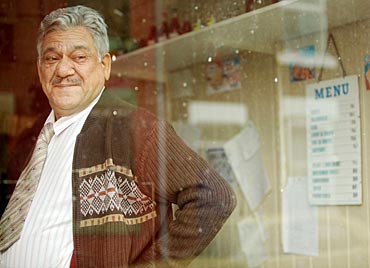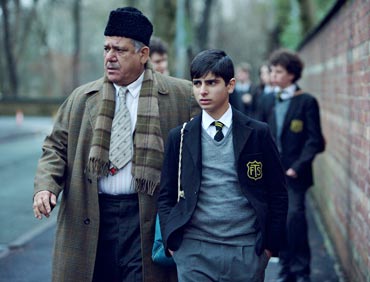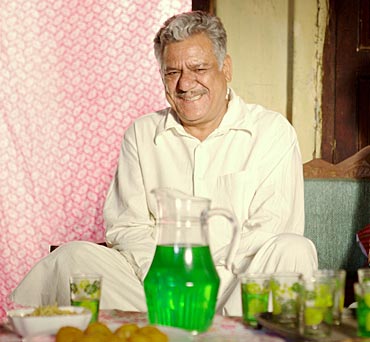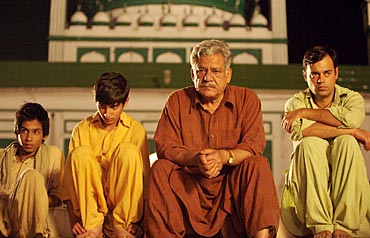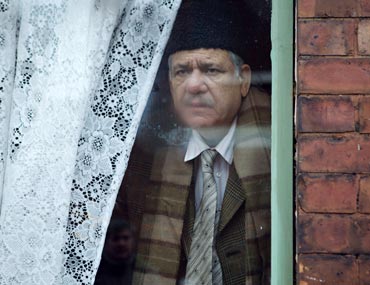 | « Back to article | Print this article |
'I never got roles that Bachchansaab did'
After the huge success of East Is East comes its sequel named, what else but West is West. Directed by Andy DeEmmony, the film stars Om Puri in his old role of the London-based Pakistani, George Khan. In West Is West, though, George comes with his family to Pakistan.
Om Puri tells Patcy N about what other changes have been wrought in his character this time, and what he thinks of his own legacy.
It's been 10 years since you first played the part of George Khan. Was it difficult to recapture the character?
It was not difficult as the character was well defined and so was the script. I have played the character before, but there is a bit of a change this time. The character is three dimensional. In East Is East he was an angry father, and we don't see any other emotions. But in West Is West you can see a variety of emotions. This is a mellow version of George Khan; he sees life in a different light today. He is sensitive, he returns to Pakistan after 25 years. He gets upset and sad and feels guilty after seeing the condition of his first wife, and wants to do something for her. He buys a house for her so that she lives comfortably. He has two daughters from his first wife, one of whom is married.
How did you work on the same mannerisms that you had in East Is East because people do change?
There are no changes in the mannerisms. George talks the same way that he did in the first movie, he has a peculiar accent, but there is growth in the character. There is a change in how he speaks to his first wife and daughters; otherwise the character is the same.
Did you have to watch East Is East to remember how you spoke? Did you add any new style to the character?
Yes, I had to watch East Is East again to get the same accent fresh in my memory.
'It is true that if the sequel had come within one or two years it would have been great'
It is true that if the sequel had come within one or two years it would have been great because in the past 10 years I have changed a lot I have put on weight, my hair has changed but when you watch the film you won't realise it because you are involved with all the emotions.
It took 10 years to make the sequel because initially they did not realise that there can be a sequel to East Is East but when it became such a successful film, they thought why not cash in on it by making a sequel. Then they started thinking about the script which took about one-and-a-half years.
Second, they had to take on a new director who then started working on the script because the last story had ended without any hint of a sequel. So they had to think all over again. As you know, the first story was the true story of the writer who had written the script, Ayub-Din Khan. But for the second part, Ayub had to create circumstances for the story to move forward.
The third reason for the delay was they did not get a producer as the European industry was going through a depression. I have done so much work in Britain but in the last six or seven years I have not got any offer from England. In between I did a couple of American films but no British film even though I used to live in England for my work for nearly three months every year. After lots of effort this film got support from the BBC and other financiers.
The film has been successful in England and Canada where it has released. It is yet to release in America. We are hoping that it will do good business even here in India. If we do good publicity I don't see any reason why this film should flop here. Plus, word-of-mouth publicity should also work in our favour.
You had a new director, Andy DeEmmony, not Damien O'Donnell who directed East Is East. Did DeEmmony change the sensibilities of the film in any way?
The director did not change the sensibilities of the film. Andy is equally talented and very gentle, he has a cool temperament. He is very calm when he speaks to the actors and his unit. One day an actor kept forgetting his lines take after take, maybe because he was nervous. Andy just told him to take a half-hour break, but even after the break he still couldn't say his lines. So Andy asked the crew to write his dialogues on a huge paper and a person had to stand behind the camera holding the dialogues and the actor read out the dialogues and gave his shot after two or three takes. You cannot make out in the film that the actor is reading the dialogue. Andy never got angry with the actor but lovingly got the work done.
If there is a part three, will you be in it too?
Yes, I will be part of it, George Khan is not dead yet.
'The scene where the boy falls into the shit in Slumdog is ridiculous'
It is a really difficult time now for character actors to survive in this industry. The kind of films we are making don't have meaty roles for a character actor. What can a person my age do in love stories -- either the girl's or the boy's father. Good father, bad father, angry father, soft father -- it is our misfortune.
Character acting nowadays is also done by stars, so all the good characters are played by the stars. I think I am a star and many others also think I am a star, but those who make commercial cinema don't think of me as a star as my name is associated with art cinema, and I am proud of it.
Which film do you think has really crossed over?
Mira Nair's Monsoon Wedding was a big success here and abroad. I haven't seen the film so I can't comment on it, but I think it is an entertainer. Mira Nair is a smart filmmaker; she knows how to make foreigners happy.
Most filmmakers who make films in India and want them to work in the West, too, twist the Indian reality like the much-talked-about Slumdog Millionaire which got an Oscar. But the way poverty was presented in the film, that is not true poverty -- the scene where the boy falls into the shit is ridiculous. For a good laugh you are twisting the reality.
'I never propagated myself'
Do you think we have made a mark in the international film arena?
No, internationally we haven't made any mark; we have to put in more effort to do that. But the one important change is that American cinema has overtaken the film industries of countries like Italy, Germany, Poland, and Spain. All these countries made good films once upon a time but now in these counties also only American films work. We have a long way to go to reach the international market.
You have worked in both industries. How different are they?
Very different, they are more disciplined then we are. They have more technical knowledge. We bring in lots of foreign technicians for our films -- cameraman, stunt coordinator etc. We are less professional. There is no doubt that our films have improved technically but we are weak in subject matter. They are also very punctual.
There are nine directors in the Mumbai film industry who make good cinema -- Prakash Jha, Sudhir Mishra, Raj Kumar Santoshi, Vidhu Vinod Chopra, Raj Kumar Hirani, Ashutosh Gowariker, Vishal Bhardwaj, Anurag Kashyap, and Dibakar Banerjee. But unlike art cinema directors like Shyam Benegal and Govind Nihlani, who gave new actors and technicians a chance, these directors are not scouting for new talent and take only established actors.
Which actor do you think is popular and successful in crossover films?
I am. I won't be modest, I am. I have done 20 projects abroad. No other actor who has done these many films abroad.
I never propagated myself. After doing a film abroad I haven't come here and called PTI or any news agency and said I have done this project. If at all a journalist has come to know about my film they have written about it but I haven't ever called anyone and told them. If I was ever nominated for a BAFTA, I never told anyone nor did I bring photographs to show people here the productions in which I have worked.
'I do have regrets'
Who do you think is the rising star of Bollywood?
Ranbir Kapoor. But he has to still prove his versatility. There has been tremendous growth in the audience so in the near future only actors who show versatility, like Bachchansaab, will survive. Style alone will not work anymore. I think Ranbir is capable, but as I said, he has to prove a lot.
Any regrets?
I do have regrets, but the industry has given me a lot too. Art cinema gave me lots of respect, credibility. I got money from commercial cinema so that I could improve my standard of living. I don't have any complaints about that.
But I have complaints about my work. The type of work I have done in art cinema, the kind of fame I got in art cinema, the type of work I have done in foreign films, those kinds of roles I never got in commercial cinema. I did not get good work or roles, even though I am capable of doing them.
With all due respect to Bachchansaab, the characters that he plays in films like Sarkar, Khakhee or Baghban are all meaty characters, but I never got offers to play such characters, and that is my complaint.
Which of your under-productions films are you looking forward to the most?
My forthcoming film is Khap, directed by Ajay Sinha, on the theme of honour killings. There is some problem in releasing the film because it is a sensitive subject and is being opposed by the khaps (rigid caste-based groupings, mostly in north India, that lay down strict rules particularly when it comes to marriage). The film will be released, may be not in Haryana because they may burn theatres there, but in other parts of the country.
My second film is Don, where I play the same character of an Interpol officer it is a decent part, not a very small or very big role.
My third film is Agneepath. I have a good role in that of an honest police officer. There are two comedies also Choron Ki Baraat, and Bin Bulaaye Baraati.
